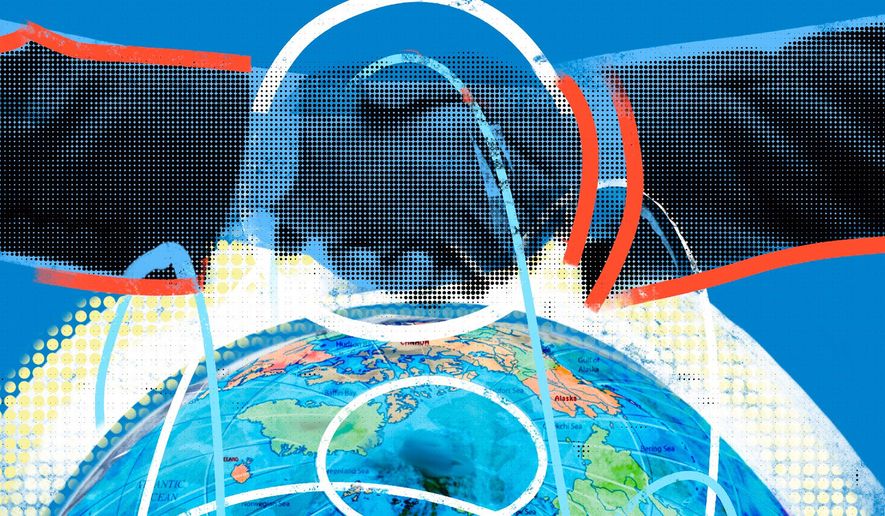OPINION:
Business leaders, politicians, pundits and intellectuals are bewailing death threats to globalization and blaming populists and nationalists like former President Donald Trump for erecting barriers to commerce.
That’s dead wrong. From the end of World War II to 2009, trade as a share of global gross domestic product tripled from about 20% to 61%, and has since fluctuated around 57%.
Models of comparative advantage teach that international trade among nations should increase as commercial barriers are reduced — the World Trade Organization and other international institutions enabled that — but then plateau below complete specialization.
Even before Mr. Trump’s and Chinese President Xi Jinping’s nationalism emerged, the accelerated expansion of global commerce ended. Markets are inclined to overshoot, so a modest pullback was inevitable.
Business pursuit of efficiency created long, vulnerable supply chains that can break because of a fire at a critical semiconductor factory, geopolitical crisis or pandemic and then not be quickly repaired. It’s no surprise that half of the Great Inflation of 2022 was attributable to supply chain disruptions.
Thanks to Russia’s invasion of Ukraine, China’s botched COVID policy and tensions in the Taiwan Strait, these risks are well recognized and businesses are behaving rationally. Rather than simply bringing production home, multinationals are diversifying.
That can be easy — for example, moving sewing machines from China to Vietnam or Mexico. Or difficult — it may take Apple eight years to move 10% of its cellphone assembly to India, because so many components are sourced in China.
Apple is also indigenizing technology, but it will be interesting to see how efficiently it can engineer in-house chips and displays currently sourced from Broadcom, Qualcomm, Samsung and LG.
Car batteries are proving a particular puzzle for national automakers to wean from Chinese and South Korean mastery.
China has seized outsized market share from textiles to solar panels, accomplished a lock on rare earth minerals and threatens to become an export juggernaut in electric vehicles through protectionist industrial policies — limiting market access to domestic manufacturers, coercing technology transfer from foreign investors, and generous subsidies.
With Mr. Trump’s tariffs failing to curb China’s mercantilism and Chinese and Russian lawyers rendering the WTO’s trade-rules enforcement mechanism a cynical threat to global security, Mr. Biden has responded with the Chips and Science Act and Inflation Reduction Act. Those aim to level the playing field in batteries, EVs, semiconductors and other cutting-edge industries.
European politicians decry U.S. industrial policies as dangerous and the end of the liberal trade order. German Chancellor Olaf Scholz sees a shift to a multipolar world.
Global reordering hardly began with Russia’s invasion of Ukraine and ban on natural gas exports, even if it accelerated the process.
Mr. Biden is defending America against China’s economic imperialism. European Commission President Ursula von der Leyen recognizes Europe’s need for its own Chips Act and IRA, and those should happen.
It’s getting awfully chilly inside the Kremlin and China’s Central Committee.
Autocrats look in the mirror and see flawless philosophers — omnipotent, omnipresent and omniscient — and then they blunder Russia into stalemate in Ukraine and China into the jaws of America’s export embargoes on technology with military applications and machinery for advanced chipmaking.
Like 1930s dictators, Mr. Xi and Russian President Vladimir Putin invested in armies instead of social infrastructure. Shortages of hospital beds and medicines in the face of COVID-19 bear witness to Mr. Xi’s obsessions.
Nothing would be available to Russia and China by taking Ukraine and Taiwan that wouldn’t be accessible had they not built armies and navies to fend off threats that don’t exist.
Now Messrs. Putin and Xi must reckon with Germany and Japan rearming.
No one is more tunnel visioned than an academic economist lamenting the efficiency losses from a fragmenting international commercial system.
Where is it written that security risks are not economic costs that should be factored when evaluating contemporary global free trade? Where has it been determined that all the economies of scale and specialization wouldn’t be exhausted by opening trade among 5 billion or 6 billion people, as opposed to all 8 billion people on the planet?
First lessons in economics show average unit costs fall when volume increases but then rise again after some critical point. A common market among the advanced democracies of Europe, North America, the Pacific and developing nations is likely big enough to maximize efficiencies.
With Russia and China as members and headed by advocates of enhanced market access for developing nations without comparable commitments for liberalization, the WTO has become an obstacle for progress.
NATO is expanding. Japan, Australia and South Korea — with assistance from the United States, France and the United Kingdom — are beefing up Pacific security cooperation.
Now the West needs to build a new trade system — for example, one with the Trans-Pacific Partnership as its hub — to ensure their industrial policies generate mutual benefit and confront the demonic threats to prosperity and civilization posed by Russia and China.
• Peter Morici is an economist and emeritus business professor at the University of Maryland, and a national columnist.




Please read our comment policy before commenting.